2. Psychology 101
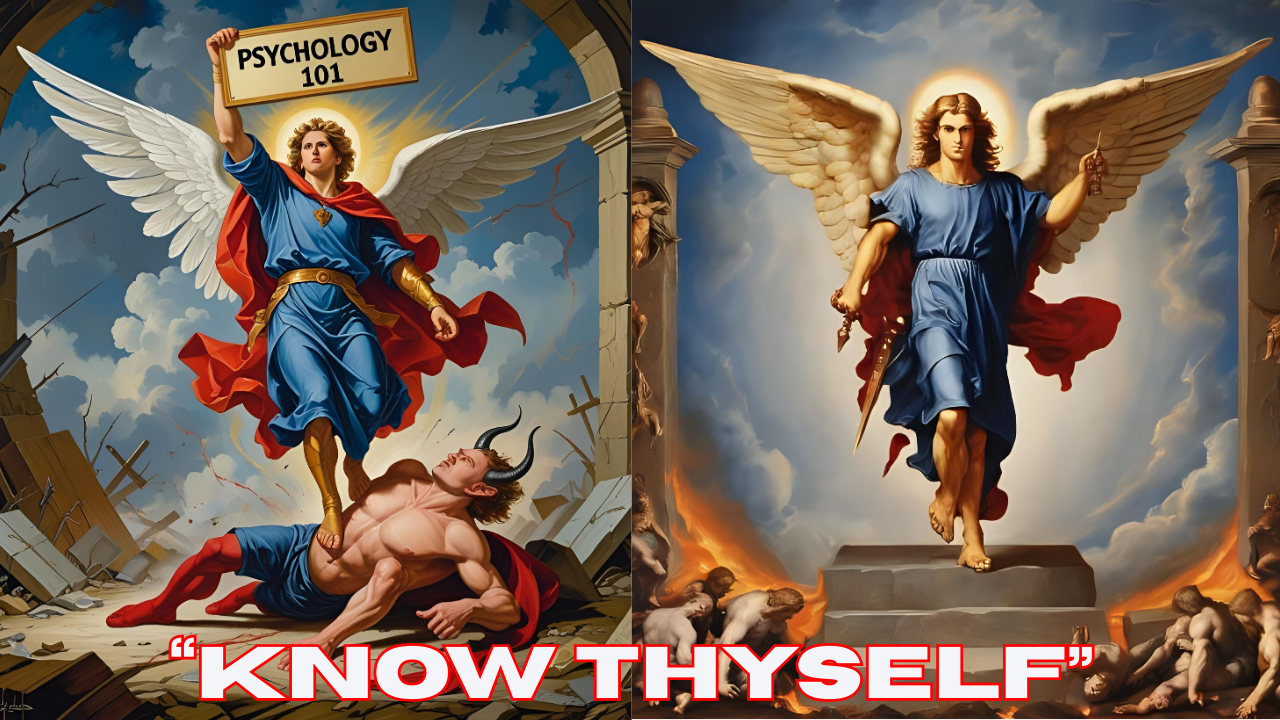
When we think about Psychology today, we rarely picture a bearded older man walking barefoot through the streets of Athens. But maybe we should. Long before Modern Psychology emerged as a scientific field, a man in ancient Greece was already asking questions about the Human Mind, Behavior, and Self-Awareness that still resonate today.
Socrates didn’t have a Psychology degree. He never wrote a textbook. But what he did do was ask questions— uncomfortable, soul-searching questions. And in many ways, that’s precisely where Psychology begins.
Modern Psychology as a Science is built on observation, evidence, and experimentation. But beyond the scientific approach, it's built on the drive to understand: Who We Are, which goes back to Socrates, and his famous line:
“The unexamined life is not worth living”.
This line remains as relevant in therapy sessions today as it was in ancient Greece among scholars, priests, astronomers, and philosophers.
Socrates challenged people to think deeply, to look inward (introspection), and to question their assumptions, convictions, motivations, drives, and beliefs. Isn’t that what happens in a good therapy session today? Or even in those quiet moments when we journal, reflect, or sit in silence with our thoughts?
Socrates believed truth wasn’t something handed down by experts—it was something we discover by thinking, questioning, and having honest conversations. As you can see, Socrates's Mindset continues to influence Psychology today, particularly in practices such as cognitive behavioral therapy, where the goal is often to uncover and challenge our own distorted thinking.
Without any fear, we can confidently say that Modern Psychology did not invent self-reflection or self-awareness, nor the Study of Human Behavior and Mental Processes; somewhat, it has refined these concepts. There is enough evidence to prove that thousands of years ago, the philosopher Socrates emphasized the importance of knowing ourselves, as demonstrated by his famous quote:
"Know Thyself"
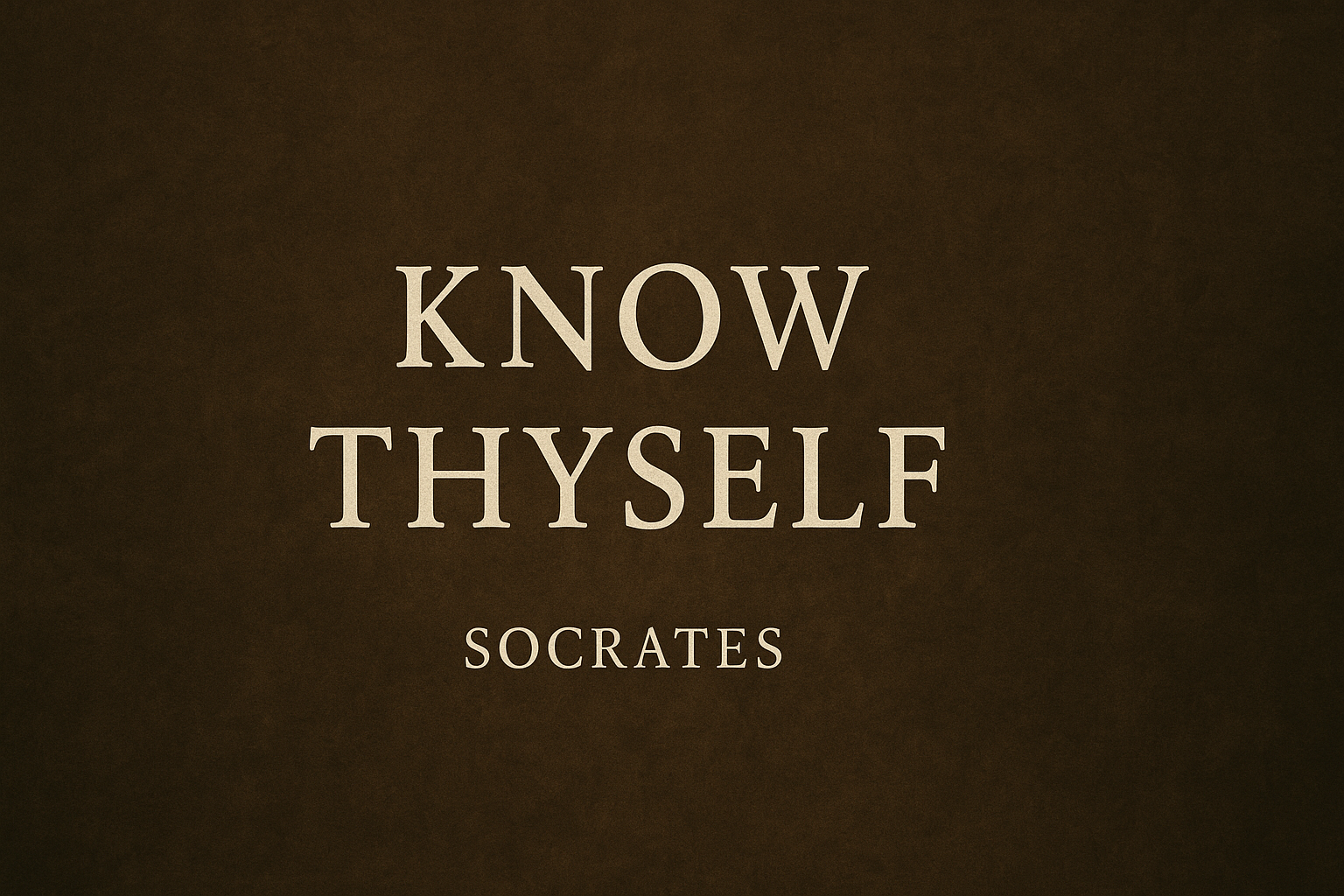
Although he wasn't a psychologist in the traditional sense, many consider him the father of Psychology.
Let's briefly examine the foundations of Psychology as a Science, focusing on the contributions of Socrates, Plato, and Aristotle, who were all born in ancient Greece (Athens) thousands of years ago.
1. SOCRATES: Know Thyself
Socrates lived in the 5th century BCE, a time when philosophers were more concerned with Cosmology and the Nature of the Physical World. But Socrates took a different path.
Instead of asking what the Universe was made of, he asked:
“What is a good life?”
“Why do people act the way they do?”
“What does it mean to Know Yourself?”
This was a revolutionary move.
For Socrates, knowing yourself, your thoughts, and your values was the foundation of a meaningful life. In this way, he laid the groundwork for Psychological Introspection centuries before the word "Psychology" even existed.
The Socratic Method
Socrates is also known for his distinctive teaching method, known as the Socratic Method, which is a more rational approach. Rather than lecturing, he asked his students a series of probing questions designed to challenge their assumptions and lead them to a clearer understanding of their beliefs.
This process — a dialogue of questioning and reflection — mirrors techniques used in modern Cognitive-Behavioral Therapy (CBT), where therapists help individuals identify irrational thoughts and replace them with more rational and healthier thoughts and beliefs. Like Socrates, Cognitive-Behavioral Therapy (CBT) practitioners encourage clients to examine their thinking and understand why they behave in the way they do.
2. PLATO: The Soul
Plato was Socrates’ most famous student. And while Socrates asked the questions, Plato tried to answer them.
He believed that human beings are made of two distinct parts: the Body and the Soul. According to Plato, our physical body is temporary and ever-changing, but our Soul is eternal and deeply connected to truth, reason, and higher understanding.
Sound familiar?
This dualism—the split between Mind and Body—would go on to influence Psychology for centuries. Even today, debates continue about the relationship between the Brain (as a physical organ) and the Mind (as a seat of Thought, Emotion, and Soul-Consciousness).
Plato imagined the Soul as having three parts:
- Reason – the logical, the critical thinking part.
- Spirit – the courageous, emotional drive, willpower.
- Appetite – the instinctual part that craves pleasure, the lust, and gluttony of the flesh.
It’s hard not to see the similarities to Freud’s later model of the ego, superego, and id—even though Freud came over 2,000 years later.
Plato and Mental Health
Plato believed that when these three parts of the Soul are in harmony, we live a just and happy life. However, when one part dominates—such as unrestrained appetite or unbalanced emotion—we fall into disorder. Isn’t that what therapy often aims to do? Bring our thoughts, emotions, and cravings for harmful pleasures of the flesh into balance?
In many ways, Plato gave us one of the earliest frameworks for inner conflict—a concept at the heart of Modern Psychotherapy.
3. ARISTOTLE: Observing Behavior
Aristotle was Plato’s student, but he didn’t always agree with his teacher. Where Plato believed in abstract ideals, Aristotle focused on the observation of the here and now.
Aristotle was the first to say:
“Let’s not just think about people—let’s actually observe them.”
From Philosophy to Science
Aristotle’s approach was groundbreaking. He believed that knowledge should be derived from experience and evidence, rather than relying solely on abstract reasoning. Aristotle's Mindset eventually laid the groundwork for Empirical Psychology—the Scientific Study of how we think, feel, and act.
He wrote extensively on topics we now consider part of Psychology:
- Memory and recall
- Emotion and Motivation
- Habits and Character
- Moral Development
- Learning through association
In fact, Aristotle described how we learn by associating one idea with another—a principle we now recognize as classical conditioning, made famous by Pavlov.
The Golden Mean and Mental Health
Aristotle also gave us the idea of the Golden Mean—the belief that virtue lies between two extremes. For example:
- Courage is the balance between cowardice and recklessness.
- Generosity is the balance between stinginess and wastefulness.
This pursuit of balance, also known as Israel (Straight to the Creator) in mystical Judaism, is a recurring theme in Psychology today, especially in therapies like Dialectical Behavior Therapy (DBT), which emphasizes emotional regulation and living a balanced life.
Why They Still Matter Today
Both Plato and Aristotle believed that knowing yourself leads to a better life.
- Plato asked us to look inward, to reflect, to master the self.
- Aristotle asked us to look outward, to observe, to live wisely and ethically.
Psychology today stands on the shoulders of both. It combines Plato’s inner world of introspection and meaning with Aristotle’s outer world of observation and information.
When we talk to a therapist, we’re often doing what Plato encouraged: exploring our values, beliefs, and more profound meanings. When a Psychologist runs an experiment or tracks behavioral patterns, they’re channeling Aristotle: looking for what can be observed, measured, and understood—information.
Bringing It All Together
You don’t need a degree in Philosophy to see the wisdom here. Socrates, Plato, and Aristotle are necessary. One without the other leaves us either lost in thought or blind to Reality. So, as we explore mental health, growth, and healing in today’s world, we’re not just riding the wave of Modern Psychology; We are continuing a conversation that began with three curious Minds thousands of years ago—Minds that still guide us toward the understanding:
Who Am I — Who We Are -and- How to Live Well.
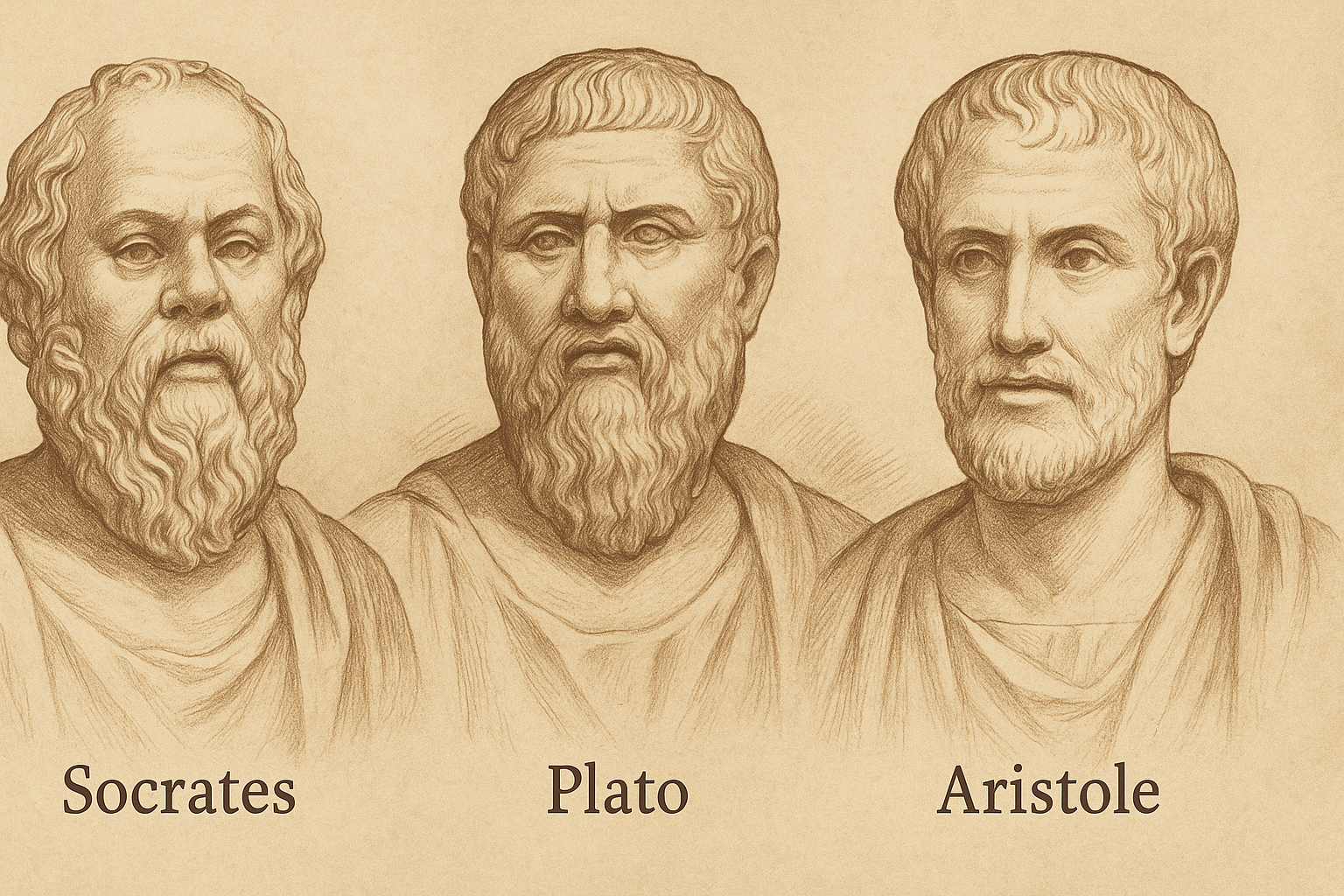
Historical Foundation of Psychology
Now that we understand the roots or beginning of Modern Psychology, let's examine the origins of the Five Scientific Schools of Psychology: Structuralism (1), Functionalism (2), Behaviorism (3), Gestalt Psychology (4), and Psychoanalysis (5)
1. Wilhelm Wundt: The School of Structuralism
After Socrates, Plato, and Aristotle laid the philosophical foundation of the human mind and thought, the conversation paused for a few centuries—until one man came along and practically said, “Let’s take these questions about the Mind... and test them.” That man was Wilhelm Wundt, and he’s often called the Father of Modern Psychology for a reason.
From Thinking to Testing
Before Wundt, questions about the Mind mainly belonged to philosophers. People thought about it, but no one really measured it.
Wilhelm Wundt changed that. In 1879, he set up the first Psychology laboratory in Leipzig, Germany. It was the moment Psychology officially separated from Philosophy and became its own Science.
Imagine it: for the first time in history, people were being invited into a lab, not to be treated or diagnosed, but to observe and analyze their own Thoughts and Perceptions. Wundt wanted to study the Structure of the Mind—how sensations, ideas, and feelings come together to form our experience. He believed that by carefully examining and recording Mental Processes, we could begin to understand how the human Mind actually works.
Introspection: The Inner Mirror
His primary method was called introspection—a focused form of self-observation. Participants would describe their mental experiences in response to simple stimuli, like the sound of a bell or the sight of a light flash.
It might sound basic now, but it was revolutionary. It was the beginning of Experimental Psychology—treating the Mind not as a mystery, but as something we can study systematically.
And think about it: Wundt’s approach was, in a way, a modern echo of Socrates’ “Know thyself” — Introspection —. However, it now came with timers, lab coats, and data sheets.
Why Wundt Still Matters
Thanks to Wundt, Psychology became more than just conversation—it became a discipline rooted in evidence. His influence paved the way for everything that followed: Behaviorism, Psychoanalysis, Cognitive Psychology, and Neuroscience. Every branch of Psychology owes something to the moment Wundt said, “Let’s bring the Mind into the lab.”
Bringing It Full Circle
- Socrates gave us the passion to Know Ourselves—consciousness.
- Plato gave us a vision of the Soul’s Complexity—reason, spirit, and appetite.
- Aristotle grounded it in Observation—to look outward, to observe, to live wisely and ethically.
- And Wundt gave us the tools to test it all in a Laboratory.
If Psychology today helps us live more conscious, balanced, and meaningful lives, it’s because people like Wundt dared to turn ancient wisdom into Modern Science.
The journey from Philosophy to Psychology wasn’t a leap. It was a slow, thoughtful walk. One great Mind after another, asking: Who Are We? And more importantly: How can we know ourselves?
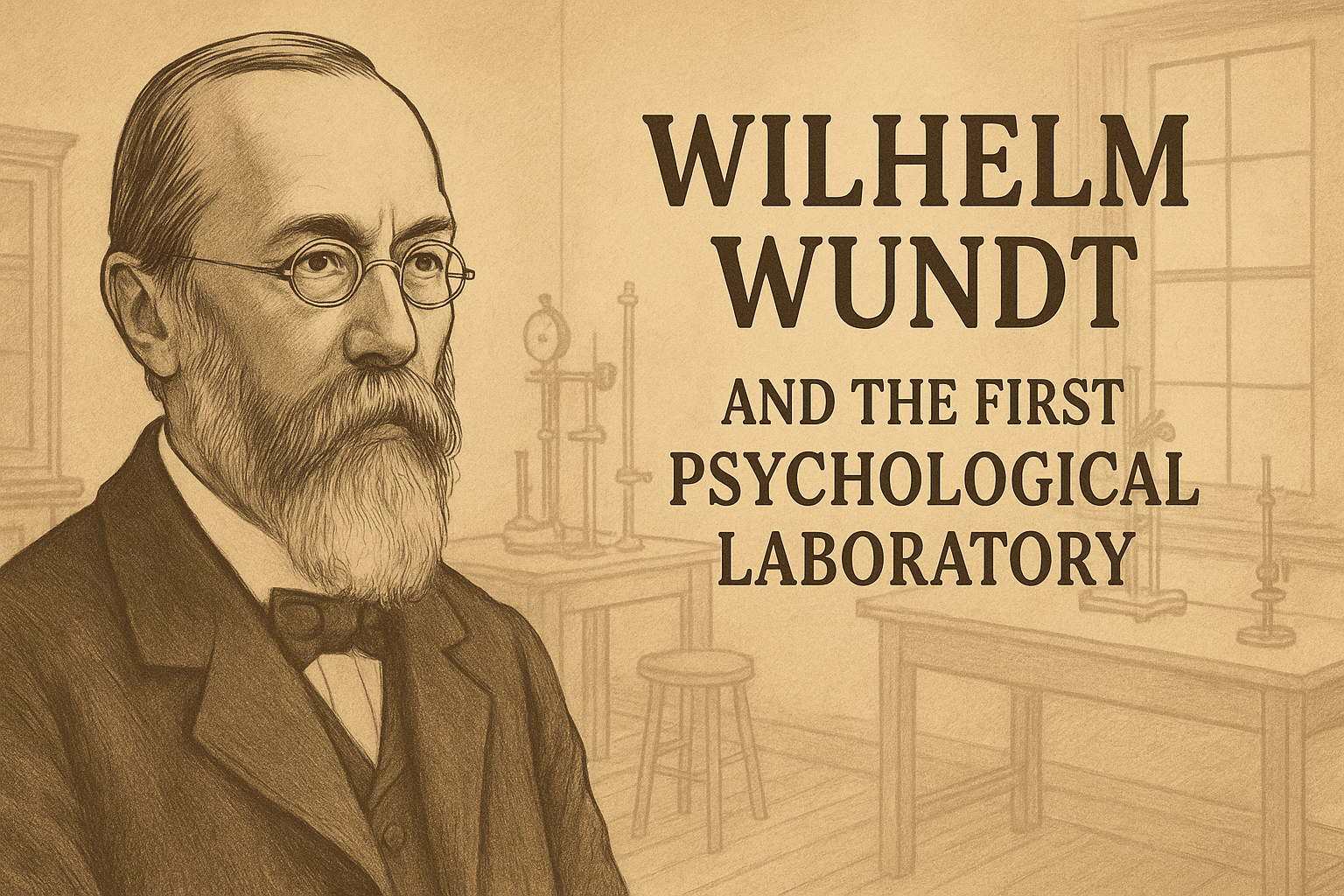
2. William James: The School of Functionalism
If Wilhelm Wundt gave Psychology its first lab coat, William James gave it a soul. While Wundt focused on the Structure of the Mind—trying to break it down into parts—James asked a different question: What is the Mind for?
That shift in focus gave birth to Functionalism, and it changed everything.
The Flow of Consciousness
James believed the Mind wasn’t something we could slice apart and label like a machine. He saw it as a stream—a flowing, ever-changing current of thoughts, feelings, and experiences.
And that stream, he said, has a purpose: To help us survive and adapt.
This was revolutionary. Instead of asking— What the Mind is made of (as Wundt did), James asked— Why it Works the Way it does. Why do we remember some things and forget others? Why do emotions matter? What’s the point of attention, habits, or even consciousness itself? Functionalism saw the Mind not as a static thing, but as a tool for navigating real life.
Practical, Human, and American
William James wasn’t just a thinker—he was a profound human being.
He taught at Harvard, wrote The Principles of Psychology (a foundational textbook still cited today), and approached Psychology with a rare blend of scientific curiosity and spiritual wonder. He believed that Psychology should be useful, not just theoretical.
James cared about emotion, free will, habit formation, and personal meaning—things that still define Modern Psychology and Therapy.
He even touched on what we now call Positive Psychology, asking how we can live fuller, richer lives. His writing is marked by a profound respect for the complexity of human experience and a conviction that Science should serve the Heart as much as the Mind.
James in Today’s Psychology
Many of James’ ideas are everywhere in Psychology today:
- Behavioral Science draws from his interest in habit and adaptation.
- Educational Psychology builds on his belief in the importance of real-world usefulness.
- Therapies like Acceptance and Commitment Therapy (ACT) echo his belief in Psychological flexibility.
- And the entire field of Evolutionary Psychology carries his legacy of asking— How do Mental Processes serve us in the big picture?
The Bigger Picture
With William James, Psychology took another leap forward. From examining the Mind (Socrates, Plato) to measuring it (Wundt lab), James brought it into the real world, asking— How It Functions in everyday life.
And that’s a question we’re still asking— What good is knowledge if it doesn’t help us live better? That’s the question that James pressed into the heart of Psychology. And it keeps the field grounded in something deeply human.
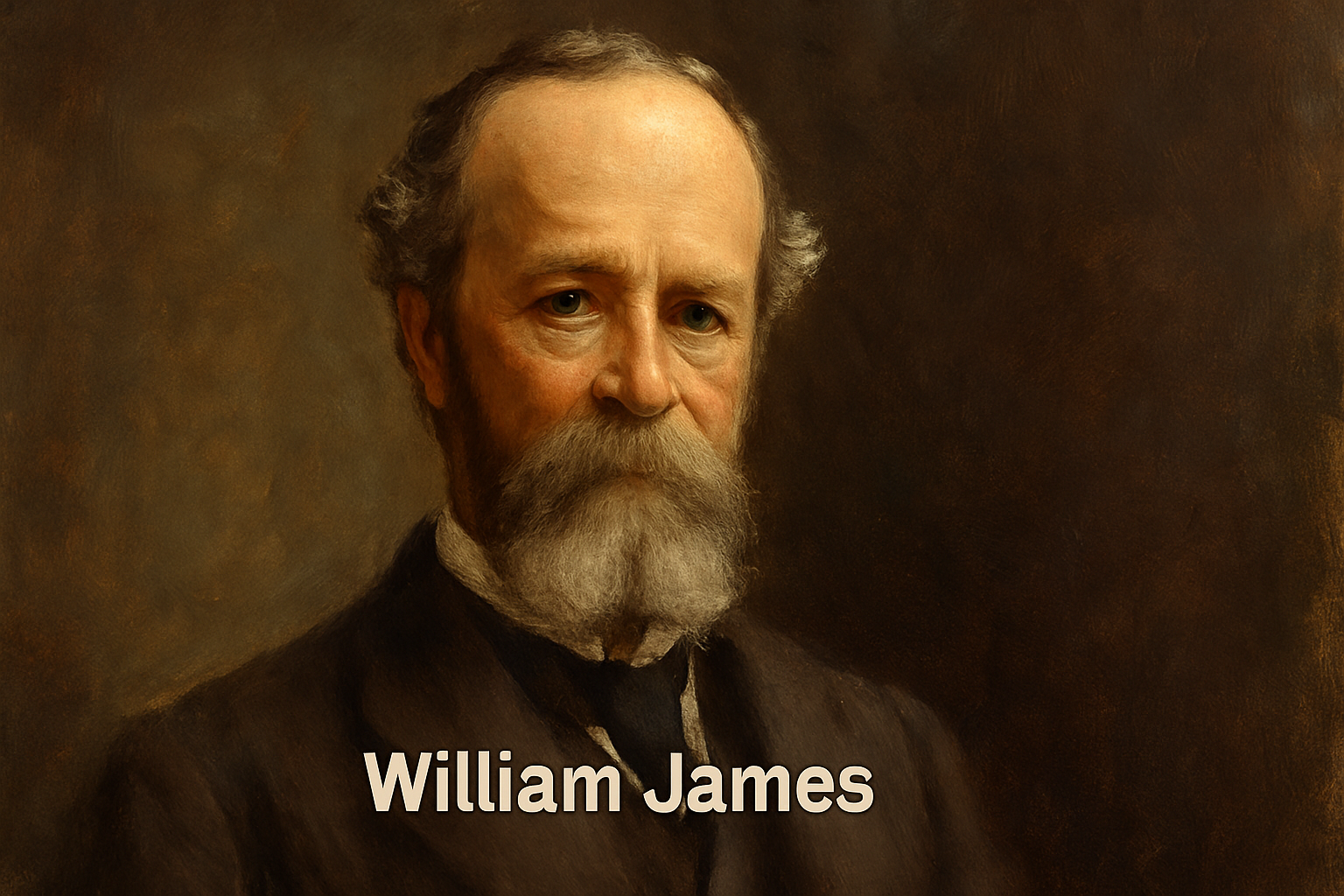
3. John B. Watson: The School of Behaviorism
By the early 20th century, Psychology had matured, but it was still in the process of defining itself. Wundt had turned it into a Science. William James had made it Practical and Purposeful. But one man came in and said: Forget thoughts and feelings—let’s talk about What People Actually Do.
That man was John Broadus Watson, and he started a revolution known as Behaviorism.
Out with the Mind, In with Behavior
Watson was bold. He believed that Psychology had become lost in the invisible—consciousness, introspection, and subjective experiences—. These were hard to measure, hard to prove, and—according to him—not scientific enough.
So he stripped it all down.
To Watson, Psychology should only study what we can see and measure: behavior, not mental processes.
No guessing— What someone’s thinking. No theories about the Soul or Mind. Just Observing, Measuring, and Anticipating Actions. Habits. Reactions.
Science is a systematic and logical approach to understanding the natural world and the universe through observation, experimentation, and analysis, generating reliable knowledge through evidence-based methods.
In his own words: “Psychology as the Behaviorist views it is a purely objective experimental branch of natural Science.”
The Little Albert Experiment
One of Watson’s most famous (and controversial) studies was the Little Albert experiment. He wanted to show that even Fear—a deeply emotional response—could be learned.
In the Study, he took a baby (Albert), showed him a White Rat—an unconditioned stimulus— and paired it with a loud, frightening Noise—a neutral and conditioned stimulus. Soon, Albert began to fear "the rat" after listening to the frightening Noise—a conditioned stimulus that triggered a conditioned response—, after repeating the process a few times.
It was groundbreaking—and disturbing. The Neutral Stimulus—the Noise— can trigger in a person (Little Albert) the same Response—Fear— as long as it is programmed consciously or unconsciously in the subject.
- (UCS = UCR)
- (NS) + (UCS = UCR)
- (CS = CR)
But Watson’s point was powerful: Emotions (Fears) could be conditioned. We’re not just born with emotions or reactions; we learn them through experience, as they can be programmed or triggered by association, meaning by a Noise, Place, Smell, Person, or a conditioned stimulus (CS = CR).
Why It Mattered
Watson wasn’t interested in What People Thought. He cared about— What People Did— What People Have Lived. And that shift laid the groundwork for a whole new era in Psychology. What has conditioned my behavior?
Thanks to Behaviorism:
- Psychology became more Measurable.
- Learning theory took center stage.
- Therapies began to focus on Changing Behavior, not just "Exploring Feelings".
- Psychologists began investigating the conditioned stimuli that trigger my conditioned reactions.
Behaviorism in Your Life
Think of every time you've tried to break a bad habit, create a new routine, or respond differently in a stressful situation. You’re working with Behavior—exactly what Watson believed Psychology should focus on.
Behaviorism shows up today in:
- Education (reward systems, behavior plans)
- Therapy (CBT, exposure therapy)
- Parenting techniques
- Even your fitness tracker rewards you for steps taken or goals met
Watson’s vision turned Psychology into— A Tool for Change—something you could use, track, and apply in daily life.
From Thought to Action
- Socrates told us to examine ourselves.
- Plato and Aristotle mapped the Soul and the Pursuit of Balance.
- Wilhelm Wundt gave Psychology a Laboratory to measure Thoughts and Perceptions.
- William James made it Functional—How the Mind Functions in Everyday Life—Functionalism.
- And John B. Watson pushed us out of our heads—and into the real world of action. What People Did— What People Have Lived.
His work reminds us that sometimes, the Key to change isn’t overthinking. It’s taking a closer look at— What We Do—What We Did—What We Lived.
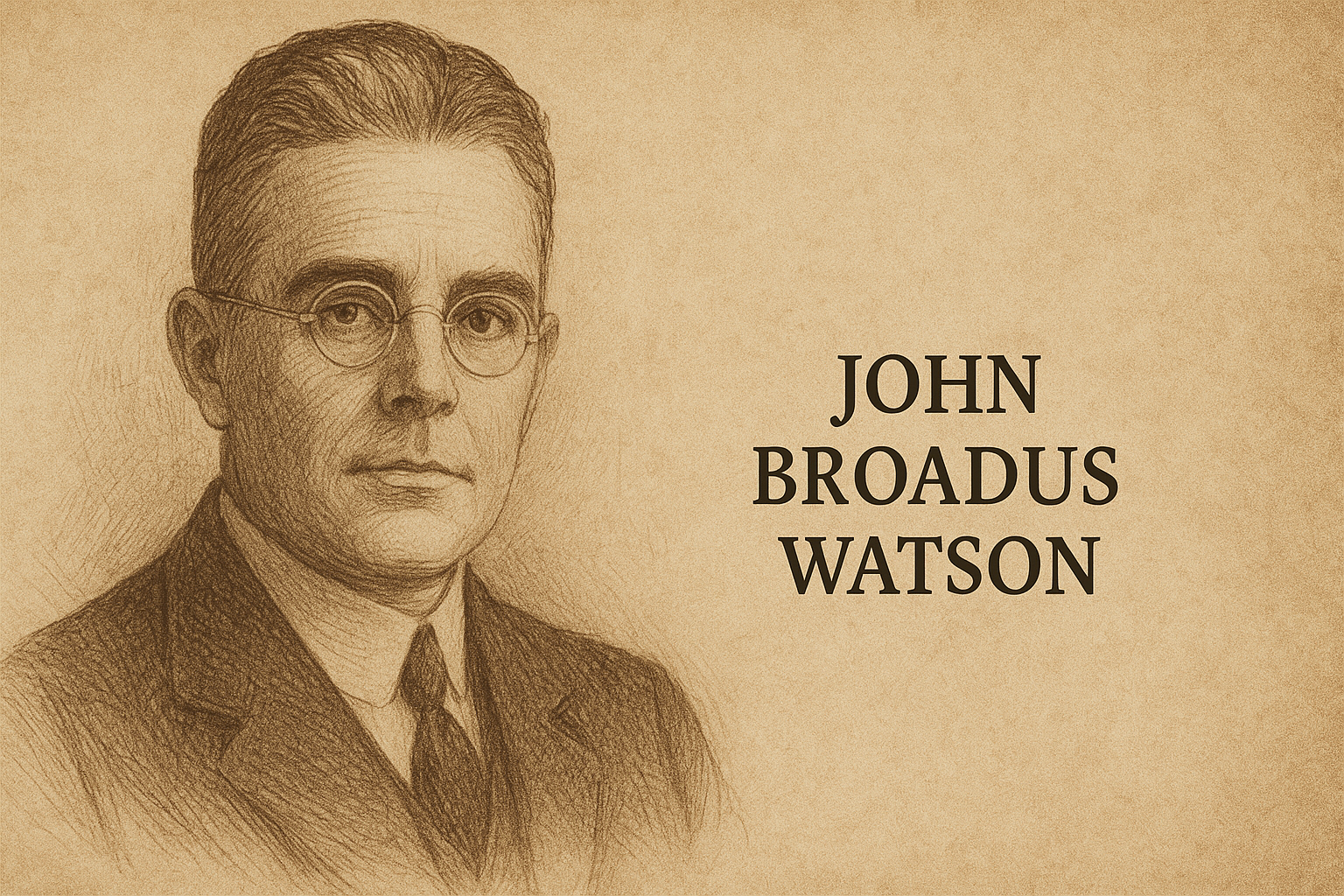
4. Max Wertheimer, Wolfgang Köhler, and Kurt Koffka: Gestalt Psychology
Just when Psychology seemed focused on Behavior and Stimulus-Response patterns, a new wave of thinkers stepped in and said: Wait—aren’t we missing something?
That “something” was the whole.
And that shift gave rise to Gestalt Psychology, thanks to the brilliant Minds of Max Wertheimer, Wolfgang Köhler, and Kurt Koffka.
Their message was simple but radical:
“The whole is greater than the sum of its parts.”
Max Wertheimer: The Spark of Perception
Wertheimer was the spark that lit the movement.
He became fascinated with how people perceive motion. He noticed that when you flash two lights quickly, people don’t see two lights—they see one light moving. This illusion, known as the phi phenomenon, couldn’t be explained by Behaviorism alone.
Why? Because Perception wasn’t just about raw sensory input. It was about— How the Mind organizes and interprets experience.
That idea became the heartbeat of Gestalt Psychology.
Wolfgang Köhler: The Power of Insight
Köhler took things a step further.
He studied chimpanzees and discovered something Behaviorism had missed—Insight. In his famous experiments, chimps didn’t just learn by trial and error. They suddenly understood how to solve problems, like using sticks to reach bananas. This wasn’t conditioning. It was thinking.
Köhler demonstrated that animals (and humans) don’t always learn in a straight line. Sometimes, the Mind leaps. And that leap matters.
Kurt Koffka: Bringing It All Together
Koffka helped organize these new ideas into a system.
He emphasized that Gestalt theory wasn’t just about Perception—it also applied to learning, memory, development, and problem-solving. He brought Gestalt Psychology to the English-speaking world, expanding its reach far beyond Germany.
For Koffka, what mattered most was how we experience the world as a coherent whole, not as disconnected pieces.
Why Gestalt Psychology Still Matters
- When you see a picture come together from scattered pieces—that’s Gestalt.
- When you recognize a tune from just a few notes—that’s Gestalt.
- When you realize a problem suddenly makes sense—that's Gestalt, too ("aha moment").
Gestalt Psychology gave us timeless principles like:
- Figure and Ground (what stands out, and what fades into the background)
- Proximity and Similarity (how we group things)
- Closure (how we fill in gaps to complete patterns)
These principles are now everywhere—from therapy and learning to design, advertising, and art.
From Parts to Wholeness
Where Watson said, “Only Behavior matters,” Gestalt Psychologists said, “But How We Interpret Reality is just as important.”
- Wertheimer asked us to see the illusion behind Perception.
- Köhler reminded us that sometimes, Learning happens in a flash.
- Koffka helped spread a theory that made us rethink how the Mind works.
Together, they taught us that human experience isn’t built from pieces. It’s built from patterns. To truly understand people, we must look at the Whole Picture.
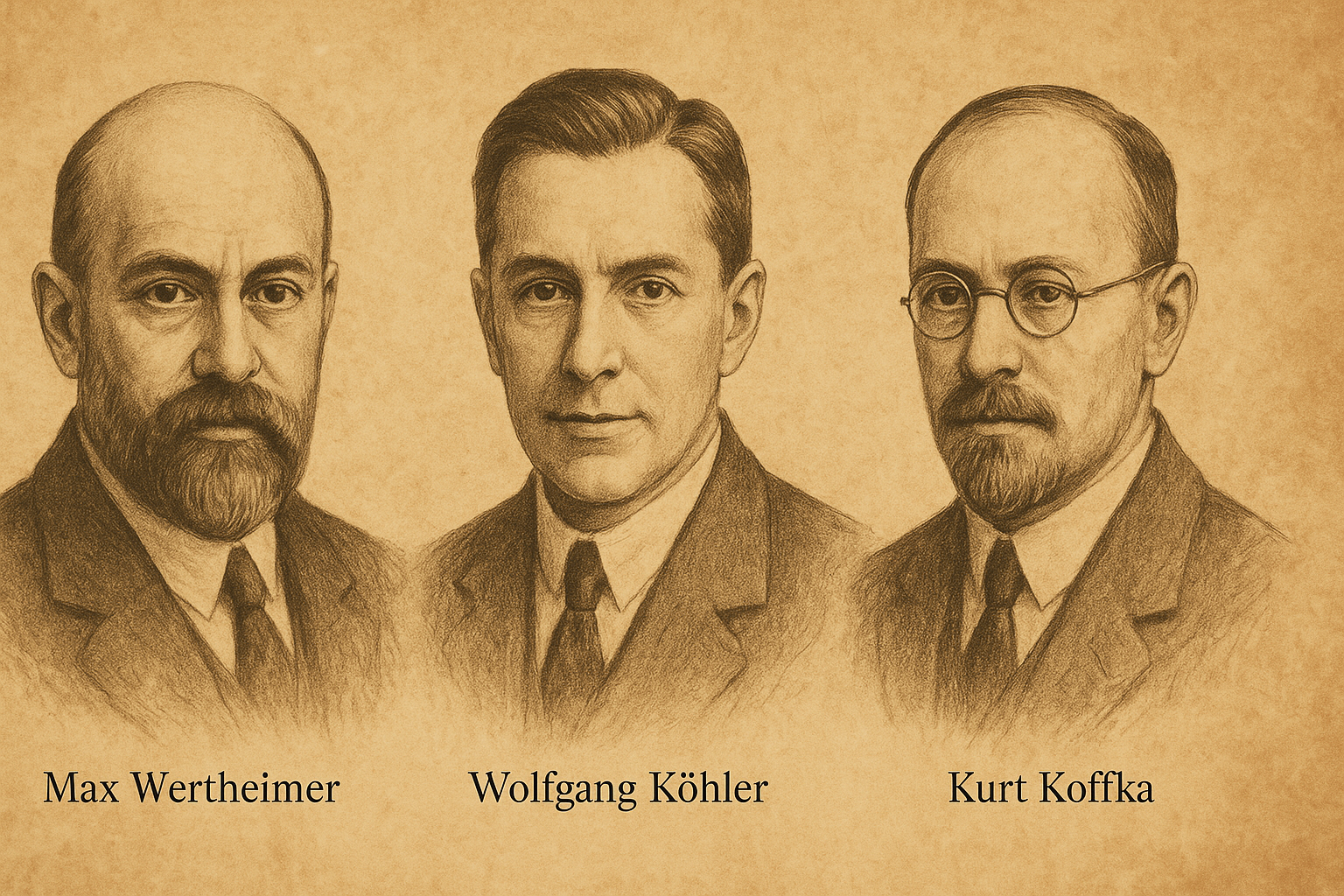
5. Sigmund Freud: Psychoanalysis
Just as Psychology began to define itself through Behavior, Perception, and Experimentation, one man stepped in and opened a door no one had dared to walk through. That man was Sigmund Freud, and the door he opened led straight into the Unconscious Mind.
Freud didn’t just want to know what people did—he wanted to know why, especially when the reasons were buried deep below awareness. With that, he gave the world Psychoanalysis—a bold, complex, and controversial theory that forever changed how we understand ourselves.
The Unconscious: The Hidden Self
Freud believed that our behavior is shaped by Forces— we don’t even realize that they are at work. He called this realm the unconscious—a mental space where painful memories, forbidden desires, and unresolved conflicts hide.
To Freud, forgetting wasn’t always innocent. Slips of the tongue weren’t just mistakes. And dreams? They were coded messages from the unconscious, waiting to be interpreted. This was revolutionary.
Psychology wasn’t just about Thoughts and Behaviors anymore—it was about what lies beneath.
Id, Ego, and Superego
Freud saw the Mind as a battlefield of three powerful forces:
- The Id: our primitive, instinctual drive—raw desire and impulse.
- The Ego: the realistic part that mediates between desire and reality.
- The Superego: our moral compass, shaped by culture, guilt, and ideals.
When these three are out of balance, we feel anxiety, inner conflict, and even neurosis. Understanding these parts, Freud believed, was the first step to healing.
Talking as Treatment
Freud also pioneered something now taken for granted in Therapy: the talking cure. He encouraged patients to speak freely—without censorship—about their thoughts, memories, and dreams. This process, called free association, helped bring the unconscious to the surface.
He believed that by making the unconscious conscious, we could understand our patterns, relieve inner tension, and begin to change.
Why Freud Still Matters
Today, some of Freud’s ideas are debated, even challenged. But his influence is everywhere:
- Modern therapy is built on his insight that words can heal.
- Defense mechanisms such as denial, repression, and projection—ideas that are still widely used—were introduced by Freud.
- His emphasis on childhood experiences, sexuality, and identity formation shaped not just Psychology but also art, literature, and culture as a whole.
*Even the idea that we all carry hidden parts of ourselves—now explored in trauma work, dream analysis, and even neuroscience—began with Freud.
Freud explored the depths of the Soul—and gave Psychology a mirror to look inward. Freud’s gift was his courage to ask: What if the answers to our problems are hidden within us?
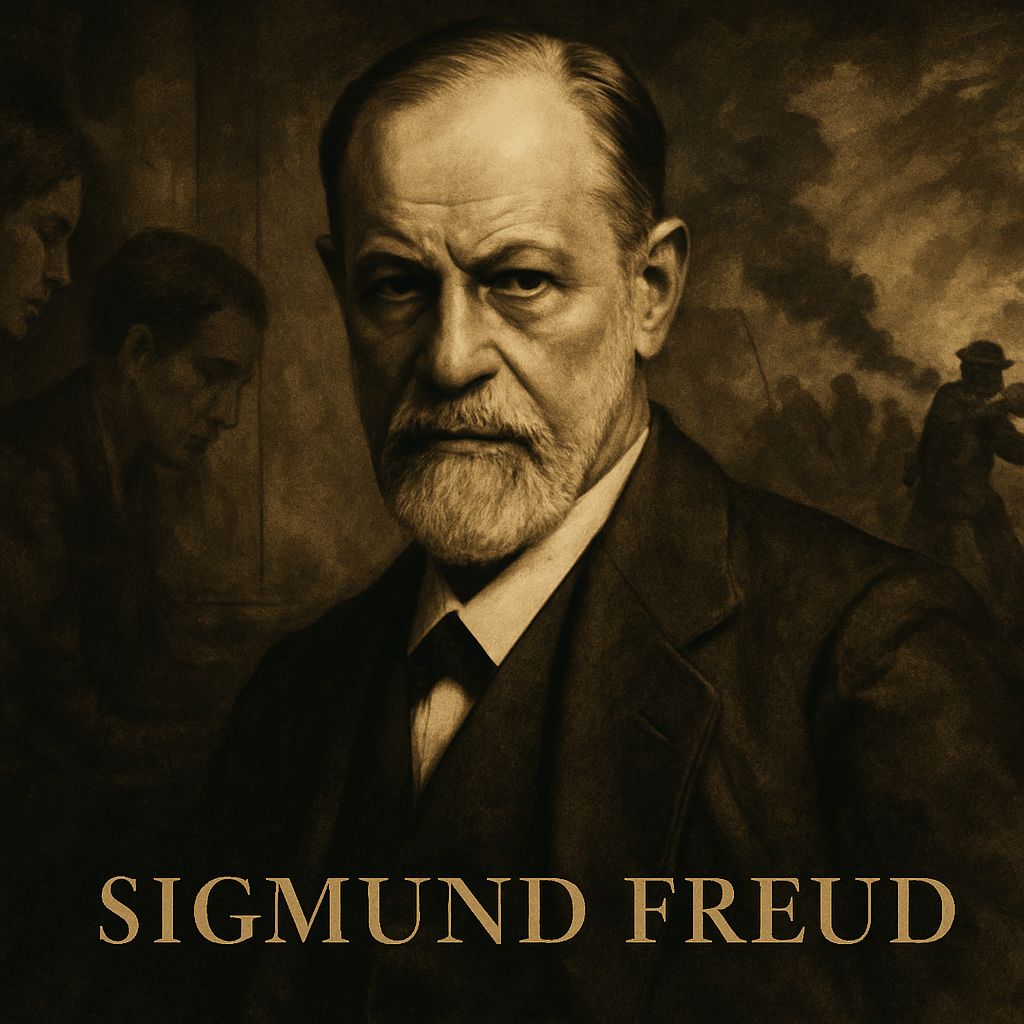
Final Thought: One Mind, Many Lenses
As we look back on the evolution of Psychology, it becomes clear: There’s no single way to understand the Human Mind.
Each school of thought we’ve explored—Structuralism, Functionalism, Behaviorism, Gestalt Psychology, and Psychoanalysis—offered a unique lens. Not one of them tells the whole story, but together, they give us something far more powerful: Perspective.
- Structuralism asked: What is the Mind made of?
It gave us the first attempt to dissect consciousness, piece by piece. - Functionalism asked: What is the Mind for?
It reminded us that thoughts, emotions, and behaviors exist for a reason—they help us survive, adapt, and grow. - Behaviorism said: Forget the Mind—watch what people do.
It made Psychology measurable, practical, and focused on action. - Gestalt Psychology said: You’re missing the bigger picture.
It taught us that the Mind doesn’t just collect parts—it creates meaning. - Psychoanalysis said: Look deeper.
It revealed the Unconscious Forces beneath our Thoughts and Behaviors—the unspoken, the repressed, the emotional roots of our actions.
What makes these Perspectives so meaningful isn’t that they agree—it’s that they challenge each other. They stretch our understanding. They force us to ask better questions. And that’s the beauty of Psychology.
It’s not about finding one correct answer. It’s about staying curious, staying open, and daring to explore what it means to be human from every possible angle.
In the end, we don’t need to choose between Freud and Watson, or Wundt and James. We need all of them. Because the Human Mind isn’t a puzzle with one solution. It’s a mystery best approached with many Minds, many tools, and endless wonder. Today, we no longer have psychologists who describe themselves with these five historical schools of Psychology. Instead, they relate themselves in one or more of the Six Basic Psychological Perspectives in Psychology: The Biological Perspective (1), The Cognitive Perspective (2), The Humanistic-Existential Perspective (3), The Psychodynamic Perspective (4), Perspectives on Learning (5), and The Sociocultural Perspective (6).
*Please, Read "Introductory Psychology" by Spencer A. Rathus (PSYCH7).
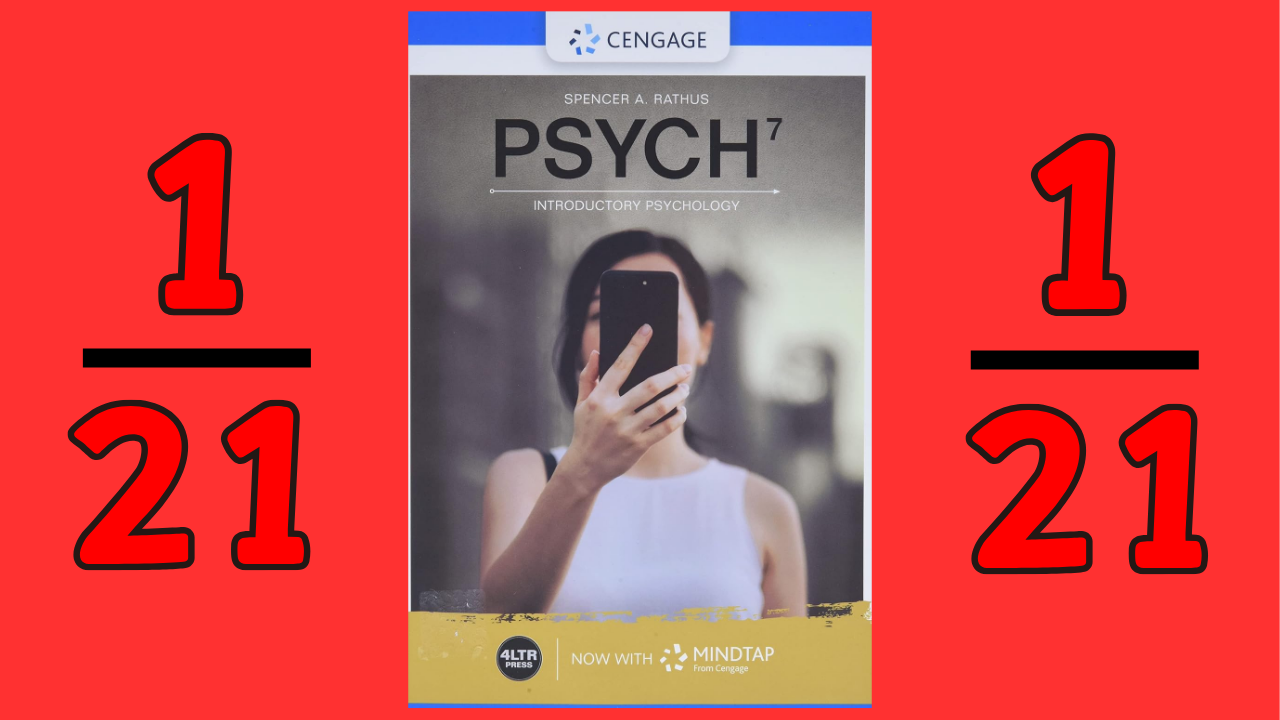
Psychology as a Science
Psychology, like any other Science, has specific goals— it seeks to describe, explain, predict, and control the events it studies. Psychology as a Science describes, explains, predicts, and controls human behavior and mental processes. This does not mean that psychologists seek ways to manipulate and control people, but rather to help individuals cope with their traumas, depression, anxiety, fears, and social pressure. Unfortunately, in the end, it's mainly used to control, to sell effectively, and to win wars.
It is important to note that psychologists, among other roles, develop theories to explain the relationships between various events. These theories enable them to provide explanations and make predictions regarding psychological issues that may lead to feelings of depression, fear, or anxiety. A key point to emphasize is that a strong theory should be able to predict behavior. If a theory fails to predict the events it examines, it may need to be revised or replaced.
The capacity to predict human behavior is precisely what underpins Psychology's classification as a Science.
What Psychologists Do
They engage in Pure Research (I), Applied Research (II), Practice (III), and Teaching (IV).
I. Pure Research
When psychologists engage in "Pure Research" (also called Basic Research), they are focused on advancing knowledge and understanding of human behavior and mental processes, without necessarily aiming for immediate practical applications or solutions.
In contrast to Applied Research (which solves specific problems), Pure Research explores fundamental questions like How does memory work? — What drives motivation? — How do children develop moral reasoning? — What brain processes are involved in emotion?
II. Applied Research
When Psychologists engage in "Applied Research," they use psychological theories, principles, and methods to solve real-world problems. Unlike "Pure Research" (which seeks to expand knowledge), Applied Research is practical — it aims to make a direct impact on individuals, organizations, or society.
Applied Research addresses questions like — How can we reduce Workplace Stress? — What's the best way to teach reading to children with Dyslexia? — How do we design safer, more User-Friendly Technology? — What intervention helps teens Stop Smoking? — It connects Science to Solutions.
III. Practice
When Psychologists engage in "Practice," they apply Psychological Knowledge, Theories, and Techniques in real-world settings to help individuals, groups, or organizations improve their mental health, behavior, and overall functioning. It differs from "Research" and "Teaching"— It typically involves direct service to clients. They might provide expert advice, support team decision-making, or offer second opinions. Licensed Psychologists must adhere to the APA Ethical Principles of Psychologists and Code of Conduct.
IV. Teaching
When Psychologists engage in "Teaching," they share Psychological Knowledge, Theories, and Research with students, professionals, or the general public. Unlike "Practice" (which is client-focused), "Teaching" is about Education, Training, and Intellectual Development — shaping how others understand and apply Psychological concepts.
Here's a breakdown of what Psychologists do in the "Teaching" role:
1. Educating Students at All Levels
Psychologists teach in High schools, Colleges, and Universities — as well as Medical or Professional Schools (e.g., psychiatry, education, business).
They may teach courses like Introduction to Psychology, Cognitive Psychology, Abnormal Psychology, Research Methods, Psychological Statistics, and Counseling or Clinical Skills.
2. Developing and Delivering Course Content
Psychologists are responsible for designing syllabi and learning objectives, creating lectures, discussions, and assignments, evaluating student performance, and adapting material for diverse learners.
3. Teaching Research Methods
Because Psychology is a Science, Psychologists emphasize the design of experiments, data analysis (Statistics), and the interpretation of results to understand Psychological literature. This helps students become critical thinkers and informed consumers of Research.
4. Mentoring and Advising
Psychologists often serve as Research Mentors, guiding students on Career paths (Therapy, Research, Organizational Roles), Graduate school applications, Research projects, or Theses, and Ethical decision-making in Psychology.
5. Public Education and Outreach
Psychologists also teach beyond academia, offering Public lectures or webinars, Media appearances (TV, podcasts, blogs), Training for teachers, police, political, or business leaders, and Workshops on mental health, communication, or leadership. This helps bridge the gap between Psychological Science and Society.

What is the Study of Psychology used for?
Psychology — or —
The Scientific Study of Human Behavior and Mental Processes is used mainly:
I. To Control
In other words, To Establish a Government that prevents part of the population from falling into chaos. This is the psychological root and justified reason for the existence of the Economic, Political, and Religious Powers, to avoid chaos. These entities govern by controlling the supply of Knowledge and Information, which can be seen as a necessary evil.
Economic, Political, and Religious Leaders use Psychology to control individuals, economies, nations, and subordinate institutions. The Intention behind this is to create Peace and Order through Laws, Taxes, Regulations, and Economic, Political, and Religious Ideologies. What would happen if these Economic, Political, and Religious Institutions or Ideologies did not control the Masses? Simply put, anyone who wants to steal, kill, and destroy can do so without restriction or punishment. Chaos!
Now that we all know, Psychology is mainly used to control and avoid chaos. Welcome to the psychological reasons and roots of the Government, the Central Banking System, Capitalism, and Organized Religion.
The Economic, Political, and Religious Institutions (The Establishment) are often considered a necessary evil. Look into my eyes and tell me: Who can survive from uneducated individuals, guerrillas, and gangs without the Establishment? Even with the Establishment in place, sometimes we don't feel safe. Can you imagine our life without them? Of course, if you are a member of the guerrilla warfare, you will hate the Establishment — We all understand.
However, the Economic, Political, and Religious Powers are necessary, even though they can sometimes be illogical and cruel, since they are formed by Men, and Men are not perfect, as is the Establishment.
That's why I strongly believe in the existence of another kind of Establishment: the Kingdom of Heaven, whose mission is to bring balance — Israel — between good and evil, and sometimes has nothing to do with the Earthly Kingdom of Men or Organized Religion.
Please, read John 10:7-10:
7 Therefore Jesus said again, “Very truly I tell you, I am the gate for the sheep. 8 All who have come before me are thieves and robbers, but the sheep have not listened to them. 9 I am the gate; whoever enters through me will be saved. They will come in and go out, and find pasture. 10 The thief comes only to steal and kill and destroy; I have come that they may have life, and have it to the full.
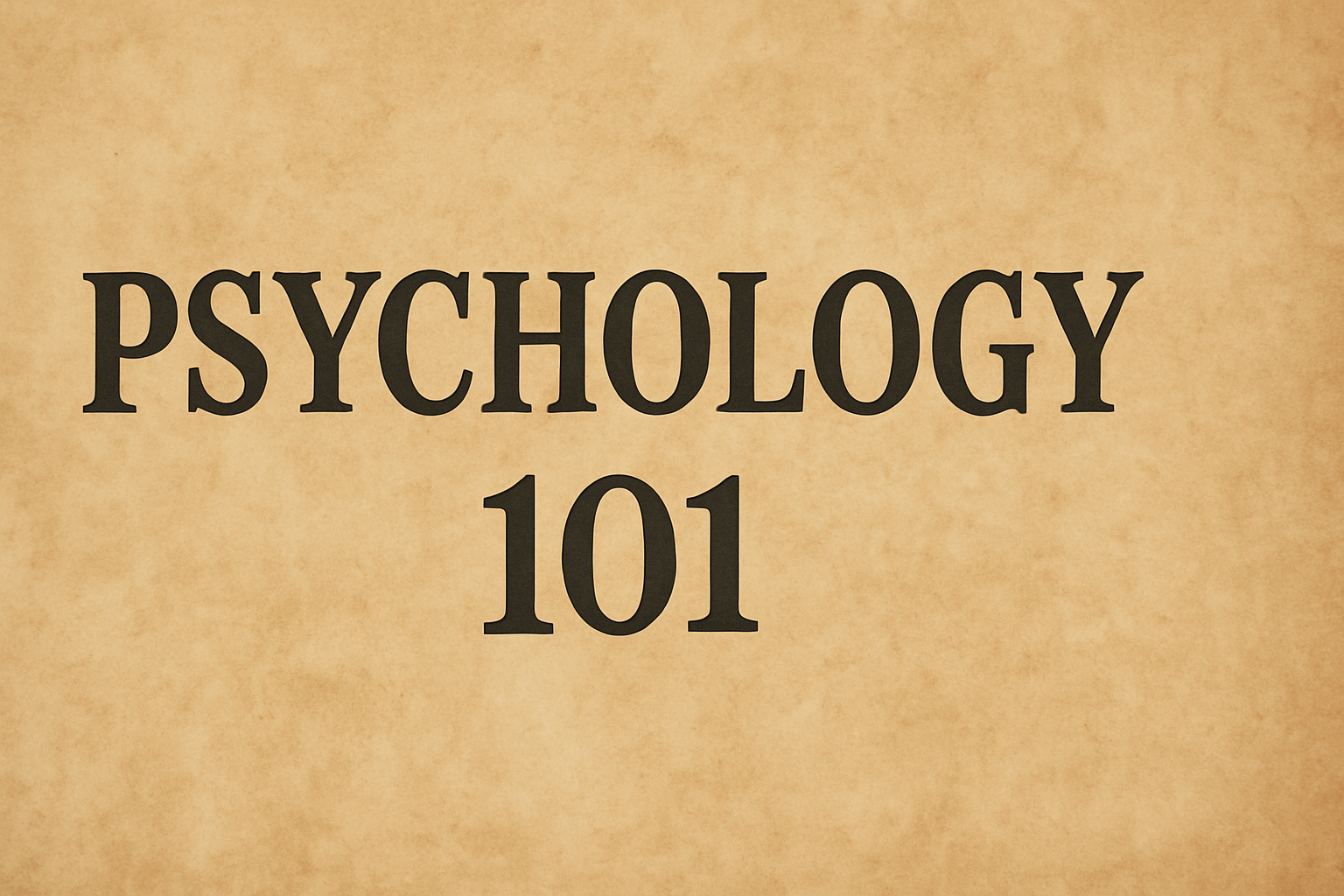
II. To Sell a Service or Product Effectively
In other words, To Establish an Economic System — Businesses —that can financially support our families and basic needs. This is the psychological root and justified reason for the existence of the Commerce Department and the Federal Banks, which provide a trustworthy currency as a means of exchange. These entities govern by controlling the supply of Money, which can be seen as a necessary evil.
A successful salesperson isn’t just someone who knows their product or service — they’re someone who understands People. Psychology provides insight into what motivates human behavior, especially when it comes to decision-making, buying, and selling.
Sales is essentially persuasion, and persuasion is a psychological art. By studying how people think, feel, and respond to certain stimuli, a skilled salesperson can:
- Build a good reputation and trust
- Read non-verbal cues and emotional signals
- Address customer pain points, rejection, objections, and deal breakers before they're even mentioned or happen
- Use language and tone that align with the buyer's psychological needs (Maslow's Hierarchy of Needs, p. 213)
- Frame the product as a solution to a problem
- Use Psychological Principles — such as scarcity, social proof, reward systems, and emotional appeal — to shape consumer behavior.
In short, Psychology helps governments, businesses, and salespeople not only close a sale but also build relationships that can turn a one-time customer into a loyal supporter for life. Selling is not about manipulation; it's about understanding People's Mindset and helping them make the right decision — a decision that has to be convenient for both parties— the seller and the buyer.
III. To Solve Conflicts and Wars
In other words, To Establish an Army that prevents outlaws and "adversaries" from jeopardizing the Establishment. This is the psychological root and justified reason for the existence of the Military Power, to avoid chaos. These entities govern by controlling the supply of Armed Forces, which can be seen as a necessary evil.
Wherever humans gather — in families, schools, businesses, religions, institutions, or nations — conflict is inevitable. But why? Because we cannot detach from our Desire to Be Right or our Desire to Receive Joy and Pleasure egoistically. Psychology teaches us that conflict is not always the problem. The problem lies in how we respond to it. Here is why Psychology is critical and what it should be used for. Studying Psychology equips individuals and leaders with the skills to analyze the root causes of conflicts and wars, unmet needs, misunderstood intentions, suppressed emotions, or clashing cultural differences. Once we understand why someone is angry, fearful, or defensive, we can begin to respond with empathy, not escalation.
Conflict and War resolution depend on:
- Active Listening
- Emotional Intelligence
- Nonviolent Communication
- Understanding Cognitive Biases and Defense Mechanisms
In diplomacy, therapy, education, and even personal relationships, these tools create bridges rather than barriers. Without Psychology, we are left to react unprepared, which often worsens the conflict or war. But with it, we become problem-solvers, peacekeepers, and healers. Conflict is part of life, but Psychology offers us the map to navigate it with wisdom, patience, and clarity.
Psychology also allows us to predict human behavior by understanding the Motives, Emotions, and Mental Processes behind Words, Actions, and Reactions. When we know how people think and why they act the way they do, we can anticipate what might happen next— and prepare for it. Ultimately, Psychology plays a crucial role in the context of Solving Conflicts and War. Failing to Study Human Behavior and Mental Processes (Psychology) leads to chaos and unnecessary wars. Just like ignoring red flags in mental health can result in breakdowns. Sun Tzu, a Chinese military general and author of the book "The Art of War," expresses it like this:
If you know the enemy and know yourself, you need not fear the results of a hundred battles.
*Please, Read "The Art of War" by Sun Tzu.
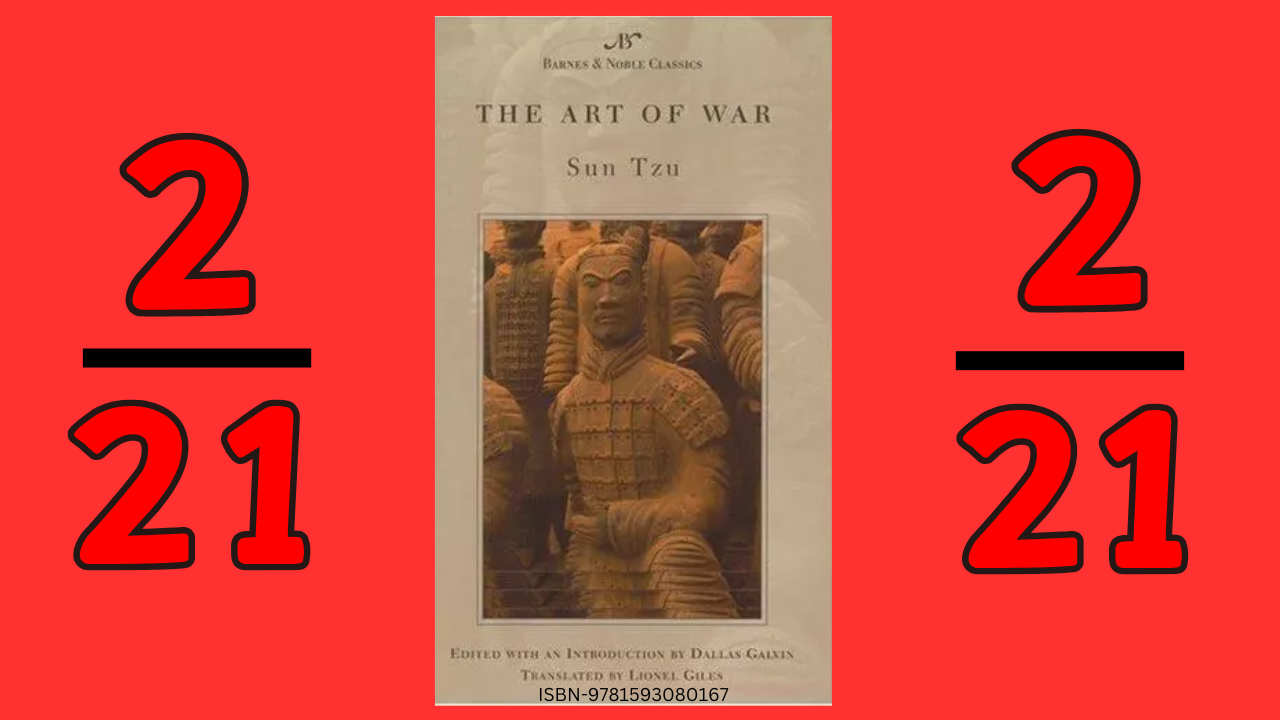
Final Reflection: Why Psychology Matters More Than Ever
In a world driven by rapid change, deep division, and constant communication, the study of Psychology is no longer optional — it's essential.
To Control is not simply to dominate, but to maintain order in a complex society. Economic, Political, and Religious Institutions rely on psychological principles to shape behavior, enforce norms, and protect the social fabric. Without this structure, chaos can emerge — and history has shown us what happens when the human Mind is left unchecked.
To Sell a Service or Product Effectively is to connect, communicate, and inspire. Understanding the Mind of another and the dire consequences of particular behaviors allows us to influence ethically, build trust, and meet real human needs — whether we’re selling a product, an idea, or a vision for a better world.
To Solve Conflicts and Wars is about restoring relationships. Through empathy, emotional intelligence, and communication, Psychology gives us the tools to mend what is broken — not by silencing the "adversary", but by understanding it.
Ultimately, Psychology is the mirror and the manual: it reflects who we are, and it teaches us how to live better — individually and collectively. The better we understand the human Mind, the better we can shape a world worth living in.
Is It Critical for Psychologists to Have Critical Thinking Skills?
It’s absolutely critical for psychologists to have strong critical thinking skills!
Psychology is the study of human behavior and mental processes, but simply collecting information or observing patterns isn’t enough. Without critical thinking, a psychologist risks making decisions based on personal bias, public pressure, false assumptions, or incomplete data — which can lead to misdiagnosis, ineffective interventions, or harmful advice.
Here’s how critical thinking connects to the three purposes we covered:
- To Control: Psychologists must analyze not just how to guide behavior, but whether their methods are ethical, sustainable, and free from manipulation. Critical thinking helps them weigh the dire consequences of using counterproductive ideologies in economics, politics, and religion.
- To Sell a Service or Product Effectively: Whether selling an idea, a treatment plan, or a social initiative, psychologists must evaluate what’s persuasive versus what’s exploitative — another area where critical thinking is key. Ask questions, conduct research, and think beyond the surface level.
- To Solve Conflicts and Wars: Conflict resolution demands the ability to question surface-level narratives, identify the real root causes, and craft solutions that are fair and evidence-based. Without critical thinking, it’s easy to side with emotion instead of facts or truth.
In short, without critical thinking, a psychologist may hold the keys to the human Mind — but never truly know how to unlock it. Critical thinking ensures that their influence is accurate, ethical, and beneficial, which is essential when dealing with Conflicts and Wars.

